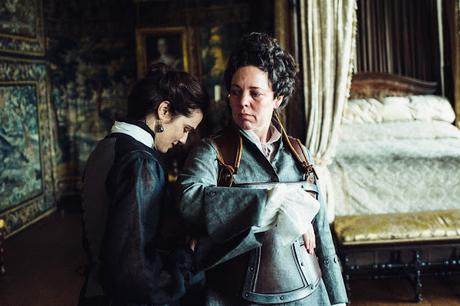
As much as Yorgos Lanthimos Dogtooth and The Favourite are different - set in different time periods, The Favourite glittering with the beautifully detailed costumes that a big production can afford - the two films share a sense of profound isolation and loneliness. As much as its central characters are seeking - power, connection, influence, being lifted up from loss and shame - they are also stranded in their individual skins. Olivia Colman's Queen Anne (who gives an outstanding performance here in a film of strong performances) is the best example. She is about to become the most powerful monarch in the world, and yet is so stunningly miserable, so literally and figuratively in pain, that it is hard to believe she can suffer her life at all. She has assembled cages filled with rabbits who all stand in for children lost to miscarriages and short lives. None of them have made it to adulthood, and after her death, she will be succeeded by a king from a different house. She is in constant pain from gout, mostly incapable of walking around unaided, and yet feeding her loneliness and abandonment with food that will never fulfill her.
The only light, the only thing that occasionally brings her moments of lightness and joy, is childhood friend and confidante Sarah Churchill, Duchess of Marlborough (Rachel Weisz, fashioned like a tumblr fever dream). She shares her confidence and her bed, and has, through political intelligence and a mind attuned to how power moves through the institutions in England, become the most influential person at court, so much so that her decision shape England's involvement in the War of the Spanish Succession. It would be easy to confuse Sarah's care for Queen Anne as something solely driven by her love of power. In fact, she seems truly fond of Queen Anne, and when she is discarded in favour of her cousin and upstart Abigail, her hurt is that of a betrayed lover who has lost the guiding light of her life.
The film is not too concerned about that War that is happening in the background, only about which side arguing for this or that next step will win the favour of the Queen. Sarah is the character who understands power, and has found a way to carve an unlikely niche for herself in which she has true influence over political outcomes (while her husband is fighting that very war), but it is Abigail who brings all the wit of a woman who has come into bad misfortune due to her father's terrible decisions. That wit wins in the end - and the film is driven by Abigail's lust for bettering her station, for winning back what has been denied for her. She, and the way Emma Stone plays her, is entertaining because she never apologises for what she wants, and that she is willing to do anything necessary to get there. She sees and understands the relationship that Sarah and the Queen have, and instead of a more expected moral outrage, or an attempt to blackmail Sarah, she simply decides to see if she can't win the Queen's favour by being a better version of Sarah - one more demure and less obviously seeking political influence, but one, in the end, that much more disingenuous in her love for Queen Anne. The thing that Lanthimos, or the beautiful script written by historian Deborah Davis, who spent decades trying to turn her story into a film, manages here is to still capture the void that envelopes Abigail once she has managed all that she set out to do. Even after all she has planned has happened, she has not truly won Queen Anne's affections, she hasn't gained any meaning, the orgies and the drinking and the unhappy husband who was just a means to an end do not provide anything more lastingly satisfying than the small moment when she gained a room of her own.
The most beautiful, and most horrible scenes that The Favourite has to offer is after Queen Anne has exiled Sarah, and both of them stew in their loneliness and misery, unwilling to forgive each other, yet incapable of living meaningfully without each other. Sarah sets out to write a hundred letters, after being advises to repair her relationship, and whittles her pain and hurt down to one letter that would, very likely, change Queen Anne's mind. Queen Anne, promises just such a letter, waits and waits, while her health declines more and more, while new favorite Abigail abandons her and does nothing to soothe her pain, for that letter, not knowing that Abigail has intercepted it and thrown it into the flames, ending a decades long relationship between two women that will now never be repaired, and all for a powerful husband and her husband's friends's advancement in parliament.
There are other films that show the ultimate emptiness of such total power, the loneliness of being surrounded by people who just want things, but are never willing to give themselves completely (obviously, Marie Antoinette, set only half a century later), but somehow, in this tragicomedy that sometimes ventures on the absurd (something that Nicholas Hoult accomplishes masterfully here, playing historical figure Lord Harley), the depth of sadness is more profound and pronounced, and it is so mainly because of what Olivia Colman does with a character who could so easily be nothing but a caricature of misplaced and fading power.
2018, directed by Yorgos Lanthimos, starring Olivia Colman, Rachel Weisz, Emma Stone.

